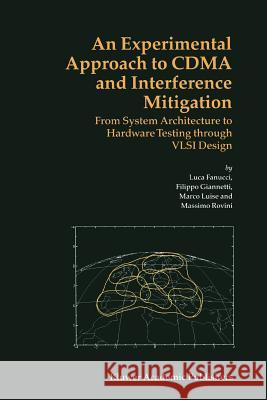An Experimental Approach to Cdma and Interference Mitigation: From System Architecture to Hardware Testing Through VLSI Design » książka
An Experimental Approach to Cdma and Interference Mitigation: From System Architecture to Hardware Testing Through VLSI Design
ISBN-13: 9781441954213 / Angielski / Miękka / 2011 / 274 str.
An Experimental Approach to Cdma and Interference Mitigation: From System Architecture to Hardware Testing Through VLSI Design
ISBN-13: 9781441954213 / Angielski / Miękka / 2011 / 274 str.
(netto: 341,55 VAT: 5%)
Najniższa cena z 30 dni: 308,41
ok. 30 dni roboczych.
Darmowa dostawa!
The key of a successful approach to the complex issue of designing wireless terminals for present and future communication systems (usually addressed to as '3rd Generation and beyond') lies in a single 'magic' word: multidisciplinarity. This was actually the philosophy which inspired and drove a fruitful teamwork performed at the University of Pisa (Italy) under the auspices of the European Space Agency (ESA) with the goal of developing a digital receiver for CDMA mobile communications.
The most challenging issue of the project was the implementation into a single ASIC device of an advanced detector for multi-user CDMA signals featuring interference mitigation capability. The whole design process, starting from system specifications down to final hardware testing, required quite a demanding and synergic effort, involving telecom engineers on one side and electronic designers on the other. The development and the achievements of the project gave the authors the cue for writing this book whose contents represents the lesson learnt from such an interdisciplinary research activity.
An Experimental Approach to CDMA and Interference Mitigation was written with the admittedly ambitious intent of filling the gap between communication theory and VLSI implementation, and thus to provide a more general/theoretical approach to the design, development, and testing of a CDMA receiver. As a consequence, the concepts and techniques that are presented turn out to be applicable to a more general kind of digital wireless modems in terms of receiver architecture design and implementation.
As the reader will easily find out, the subject of digital modem design and implementation is addressed in the book starting from a theoretical approach (supported by proper bibliographic references), and is followed by application issues, with reference to an ESA experiment assumed as a case study. A complete design flow, from specification to implementation, including testing and final verification is then presented. This leads the reader step-by-step to a thorough understanding of CDMA transmission and detection, and constitutes a practical guidance for the design of VLSI wireless mobile terminals.











